Jamie Sheffield's Blog, page 16
July 11, 2013
Character Profiles: How Much is Too Much
My writing process is a mix of the pre-planning and 'seat of the pants' methodologies. I do some work beforehand, laying out some general waypoints, researching topics likely to come up in my writing, and getting to know all of the major and minor characters in the book. Once I've done that, I have a general map of where I want the book to go, but don't actually know how I'll get there; that happens in my daily writing session.
I try to write 1500 to 2500 words per day, when I'm actively writing, and generally write in a linear fashion (from the beginning of the story to the end, without skipping around). Each morning before I start, I look briefly at my pre-planning workbook, as well as the writing I did the day before; this taken care of, I start typing, and let the story spill out of my head and into my laptop.
The reason that this works for me is that I know the situation and the characters...given that...my sub-conscious takes over a bit, and I let the characters write the story. A key to this process is knowing a lot about my characters.

I fill one of these out for every character with a speaking part in my books, and it forces me to really get to know them before I start writing. One of the perennial items in the "Additional Notes" section is the name (or names) of people that I know IRL that share traits or personality or features or aspects with the character.
I was working on these character profiles yesterday, having fun getting to know the new ones, and having fun getting reacquainted with the regulars, when it occurred to me that these aren't so different from the ones that I used when I played D&D a million years ago.

The character profiles I use for writing my books, and the character sheets that I used for D&D serve much the same purpose: to help create a fiction by aiding with the suspension of disbelief with believable details. Knowing about your characters helps you to tell a better story.
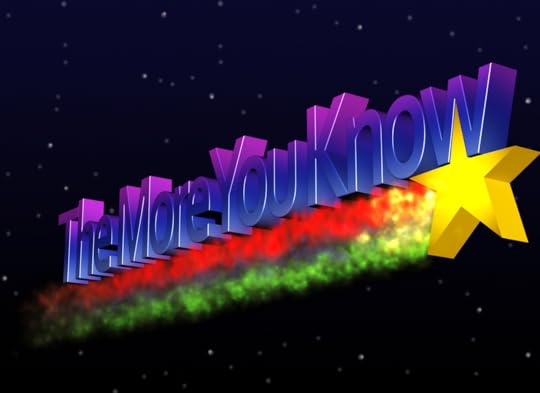 I don't worry about the fact that lots of the stuff that I know about them that will never come up, or play a part, in any book that I write, it helps to give me a solid grounding in their histories.
I don't worry about the fact that lots of the stuff that I know about them that will never come up, or play a part, in any book that I write, it helps to give me a solid grounding in their histories.
I often get into discussions with beta-reading minions about how or why one of my characters would act or react in a given situation, and I can generally answer...because I know...I know their family background and job history and favorite foods and their pets' names.
That stuff doesn't need to (in most cases it shouldn't) make it into my stories, but it's worth knowing, because it makes the characters more real to me...which will hopefully make them more real to you.
Thanks,
Jamie
I try to write 1500 to 2500 words per day, when I'm actively writing, and generally write in a linear fashion (from the beginning of the story to the end, without skipping around). Each morning before I start, I look briefly at my pre-planning workbook, as well as the writing I did the day before; this taken care of, I start typing, and let the story spill out of my head and into my laptop.
The reason that this works for me is that I know the situation and the characters...given that...my sub-conscious takes over a bit, and I let the characters write the story. A key to this process is knowing a lot about my characters.

I fill one of these out for every character with a speaking part in my books, and it forces me to really get to know them before I start writing. One of the perennial items in the "Additional Notes" section is the name (or names) of people that I know IRL that share traits or personality or features or aspects with the character.
I was working on these character profiles yesterday, having fun getting to know the new ones, and having fun getting reacquainted with the regulars, when it occurred to me that these aren't so different from the ones that I used when I played D&D a million years ago.

The character profiles I use for writing my books, and the character sheets that I used for D&D serve much the same purpose: to help create a fiction by aiding with the suspension of disbelief with believable details. Knowing about your characters helps you to tell a better story.
 I don't worry about the fact that lots of the stuff that I know about them that will never come up, or play a part, in any book that I write, it helps to give me a solid grounding in their histories.
I don't worry about the fact that lots of the stuff that I know about them that will never come up, or play a part, in any book that I write, it helps to give me a solid grounding in their histories. I often get into discussions with beta-reading minions about how or why one of my characters would act or react in a given situation, and I can generally answer...because I know...I know their family background and job history and favorite foods and their pets' names.
That stuff doesn't need to (in most cases it shouldn't) make it into my stories, but it's worth knowing, because it makes the characters more real to me...which will hopefully make them more real to you.
Thanks,
Jamie
Published on July 11, 2013 05:29
July 8, 2013
Dive into Pre-Writing in Five Easy Steps!
I published my third book last week, and after a weekend of cookouts and canoeing and boardgames and sleeping in, I'm ready...ready for the next writing project!
I dropped my son off at camp with his friends in town, my wife is at work, the dogs are sleeping all around me, the 'writing' playlist is playing on my iPod, I've had just the right amount of coffee, and I'm in the mood to write a novel...now what?
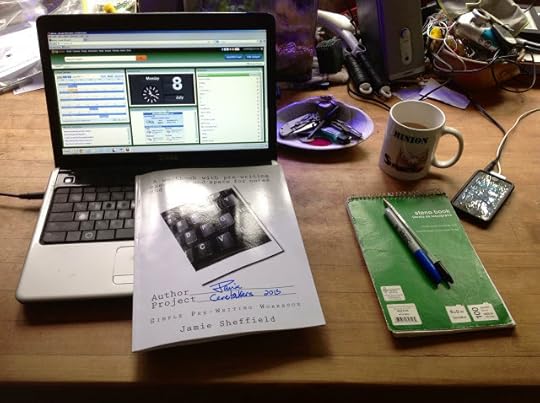
I have a process that works for me, so I thought that I would share a bit about it as I go along in my pre-writing for the coming days and weeks.
A secret that nobody but you knows is that my first book wasn't "Here Be Monsters", it was the simple pre-writing workbook that you can see on my laptop in the picture above.
I was nervous about using CreatSpace to print my first novel without practicing on something less important first, and so reverse-engineered the process that I used to write HBM, and put it all in a workbook that would both allow me to play with the CreateSpace publishing tools, and make a useful tool for subsequent writing projects.
The first five steps are surface/simple, but help to define everything that will come later in the process of writing my novel.
IDEA!
I devote a whole, mostly blank, page to detailing the big picture. I don't worry about cross-outs or spelling or specifics...I'm just trying to get the idea that has been rumbling around in the back of my head onto paper in some form. There's a box at the bottom of the page where I try to fit the idea into a single sentence description of the novel (a shorter version of the 'elevator pitch').
Free-Writing for Detail
Another mostly blank page for brainstorming 50-100 words that I associate with the idea on the previous page. Once I have an idea, these word start spilling out pretty quickly, providing me with some cues for setting and characters and storyline and twists and such.
Place/Setting
The where and when of the novel. I write a bare-bones description of the places that the novel will take the reader. I like for the place/setting to be almost a character in the novel...it has to matter that the book takes place where and when it does.
Starting with Characters
At this stage of pre-writing, I populate the story with as many of the major characters (and any minor ones that I'm aware of as well) as is possible; thinking in terms of protagonist, antagonist, major, minor, dynamic, and static. I also try to link/associate each character with someone (or multiple someones) that I know (or know about) 'in real-life'...not necessarily closely, and certainly not exactly, but it helps me to get a feel for the characters, and understand how they would react in the situations that arise in the book in a more convincing way.
Story Starters
For this final step of the first day (hopefully) of pre-writing, I think up five different scenarios introduce the cast of characters and/or set up the central conflict of the story. I usually go into this stage having a clear idea of the start that I want to use, but work at coming up with four others as well, and find that it helps me think about the setting and characters in a different way, even if I end up going with my original plan.
I worked through these steps this morning, and was happy to find that the ideas came freely from whatever part of my brain the stories live in. I've been thinking about this novel for a while, so I had some details and characters firmly in hand, but other needed a bit more coaxing.
This morning's work highlighted two bits of research that I have to take care of in the next week: an interview with a character analog and subject-matter expert, and a site-visit to reacquaint myself with the look and feel and smell and sound of Adirondack Great Camps.
I was most surprised to find that the story starter I had envisioned (and been happy with) months ago was not my favorite at the end of my pre-writing session.
The next session of pre-writing will involve a detailed analysis and biography and background of all of my characters, but before I can get to that I have an interview and a site-visit to take care of first.
Phone calls are on my todo list.
Thanks,
Jamie
I dropped my son off at camp with his friends in town, my wife is at work, the dogs are sleeping all around me, the 'writing' playlist is playing on my iPod, I've had just the right amount of coffee, and I'm in the mood to write a novel...now what?

I have a process that works for me, so I thought that I would share a bit about it as I go along in my pre-writing for the coming days and weeks.
A secret that nobody but you knows is that my first book wasn't "Here Be Monsters", it was the simple pre-writing workbook that you can see on my laptop in the picture above.
I was nervous about using CreatSpace to print my first novel without practicing on something less important first, and so reverse-engineered the process that I used to write HBM, and put it all in a workbook that would both allow me to play with the CreateSpace publishing tools, and make a useful tool for subsequent writing projects.
The first five steps are surface/simple, but help to define everything that will come later in the process of writing my novel.
IDEA!
I devote a whole, mostly blank, page to detailing the big picture. I don't worry about cross-outs or spelling or specifics...I'm just trying to get the idea that has been rumbling around in the back of my head onto paper in some form. There's a box at the bottom of the page where I try to fit the idea into a single sentence description of the novel (a shorter version of the 'elevator pitch').
Free-Writing for Detail
Another mostly blank page for brainstorming 50-100 words that I associate with the idea on the previous page. Once I have an idea, these word start spilling out pretty quickly, providing me with some cues for setting and characters and storyline and twists and such.
Place/Setting
The where and when of the novel. I write a bare-bones description of the places that the novel will take the reader. I like for the place/setting to be almost a character in the novel...it has to matter that the book takes place where and when it does.
Starting with Characters
At this stage of pre-writing, I populate the story with as many of the major characters (and any minor ones that I'm aware of as well) as is possible; thinking in terms of protagonist, antagonist, major, minor, dynamic, and static. I also try to link/associate each character with someone (or multiple someones) that I know (or know about) 'in real-life'...not necessarily closely, and certainly not exactly, but it helps me to get a feel for the characters, and understand how they would react in the situations that arise in the book in a more convincing way.
Story Starters
For this final step of the first day (hopefully) of pre-writing, I think up five different scenarios introduce the cast of characters and/or set up the central conflict of the story. I usually go into this stage having a clear idea of the start that I want to use, but work at coming up with four others as well, and find that it helps me think about the setting and characters in a different way, even if I end up going with my original plan.
I worked through these steps this morning, and was happy to find that the ideas came freely from whatever part of my brain the stories live in. I've been thinking about this novel for a while, so I had some details and characters firmly in hand, but other needed a bit more coaxing.
This morning's work highlighted two bits of research that I have to take care of in the next week: an interview with a character analog and subject-matter expert, and a site-visit to reacquaint myself with the look and feel and smell and sound of Adirondack Great Camps.
I was most surprised to find that the story starter I had envisioned (and been happy with) months ago was not my favorite at the end of my pre-writing session.
The next session of pre-writing will involve a detailed analysis and biography and background of all of my characters, but before I can get to that I have an interview and a site-visit to take care of first.
Phone calls are on my todo list.
Thanks,
Jamie
Published on July 08, 2013 09:16
July 4, 2013
Happy 4th of July!
Today is an American holiday celebrating the adoption of the Declaration of Independence on July 4th, 1776. The Declaration is is a powerful and enduring document, a cornerstone of our nation's foundation and future...there are sections of it that are known more widely than any other historical document:
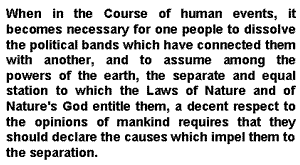

Words make a difference. Writing can change the world.
The Fourth of July, then, is a celebration not of our independence...that came later. It is a celebration of writing and ideas and expression of beliefs...it's my favorite holiday for this reason!
I'm celebrating today for another reason as well...my third book was published this morning.
I had always wanted to be a writer; always had ideas and plans and stories banging around in my head. I didn't do anything about it until last summer, when I started planning, and then writing, my first novel, "Here Be Monsters". I wrote and rewrote and edited the book, and it was published on New Year's Day of this year. I followed it up with another, shorter, book, "Mickey Slips" in April. My latest book, "Bound for Home", was published as of this morning. I am in the planning stages of my next novel, "Caretakers", which should be published early in 2014.
My words and writing aren't going to change the world, but they have changed my world and my life. I love the freedom to express and share my thoughts with the world. I love the feeling of working with Gail, my wife, my love, my minion, on these books. I love the indescribable joy that comes when someone enjoys my stories, and wants to talk with me about them.
I love being a writer, and the 4th of July is my holiday!
Thanks and have a great one!
Jamie


Words make a difference. Writing can change the world.
The Fourth of July, then, is a celebration not of our independence...that came later. It is a celebration of writing and ideas and expression of beliefs...it's my favorite holiday for this reason!
I'm celebrating today for another reason as well...my third book was published this morning.
I had always wanted to be a writer; always had ideas and plans and stories banging around in my head. I didn't do anything about it until last summer, when I started planning, and then writing, my first novel, "Here Be Monsters". I wrote and rewrote and edited the book, and it was published on New Year's Day of this year. I followed it up with another, shorter, book, "Mickey Slips" in April. My latest book, "Bound for Home", was published as of this morning. I am in the planning stages of my next novel, "Caretakers", which should be published early in 2014.
My words and writing aren't going to change the world, but they have changed my world and my life. I love the freedom to express and share my thoughts with the world. I love the feeling of working with Gail, my wife, my love, my minion, on these books. I love the indescribable joy that comes when someone enjoys my stories, and wants to talk with me about them.
I love being a writer, and the 4th of July is my holiday!
Thanks and have a great one!
Jamie
Published on July 04, 2013 04:59
July 1, 2013
New Tyler Cunningham Novella Coming Soon!
I've been working on this latest novella for a while now...life gets in the way of my writing sometime...but it's complete now, and days away from publication as a Kindle eBook!
"Bound for Home" is a Tyler Cunningham Short, a novella of roughly 22,000 words, that takes a look at Tyler only months after his arrival in the Adirondacks; in the days during which he takes his first case as a consulting detective.
It's been polished with the help of beta-reader responses/suggestions, and grew in length by nearly 4,000 words since the first draft. It is now in the hands of the SmartPig copy-editing minions, who should have it Kindle-ready in the coming days.
A sneak peek of the cover is available here for blog visitors...enjoy, and please buy the book!
 I look forward to hearing your feedback on the book, and also to beginning work on the second novel in earnest.
I look forward to hearing your feedback on the book, and also to beginning work on the second novel in earnest.
Thanks,
Jamie
"Bound for Home" is a Tyler Cunningham Short, a novella of roughly 22,000 words, that takes a look at Tyler only months after his arrival in the Adirondacks; in the days during which he takes his first case as a consulting detective.
It's been polished with the help of beta-reader responses/suggestions, and grew in length by nearly 4,000 words since the first draft. It is now in the hands of the SmartPig copy-editing minions, who should have it Kindle-ready in the coming days.
A sneak peek of the cover is available here for blog visitors...enjoy, and please buy the book!
 I look forward to hearing your feedback on the book, and also to beginning work on the second novel in earnest.
I look forward to hearing your feedback on the book, and also to beginning work on the second novel in earnest.Thanks,
Jamie
Published on July 01, 2013 10:13
June 12, 2013
The Next eReading Revolution is (Nearly) Here!

I love how the internet allows people to access information and various forms of media exactly when and how they want it. I'm astounded by how much access to media has improved and accelerated in the last few years. I get excited thinking about upcoming shifts in the distribution of information, and especially in the field of ebooks and ereaders.
I've read lots of books this year, most of them ebooks. I love the convenience of finding a book online, buying it, getting instant delivery, and beginning to read the book seconds later.
Besides downloading ebooks from Amazon and B&N and GooglePlay and Kobo, I have an account with the eNYPL, which allows me to borrow up to 12 ebooks at a time...I love the eNYPL, but wish that they had more titles available, and that they could make recommendations for me like the other sites do.

I envision a book rental/delivery system that combines the best of Netflix and Amazon Prime and Pandora (or Spotify)
A low monthly subscription feeA vast selection of the best books on the planetAn algorithm that learns about our preferences, and suggests our next favorite book Something like the original Neflix pricing structure would probably work best in the beginning, with graduated fees, based on your chosen usage pattern - $19.95/month for unlimited books, including three downloadable at a time; $9.95 for 3 books/month, including one downloadable at a time.
Since music and movies have switched from the individual book purchase to a subscription service model, it makes sense that books will do the same before long. As a reader, I'd love it; as an author, I'd love to have my books become a part of it as well.
Amazon Prime makes a weak attempt at breaking in to this new paradigm, but one book per month means it's completely useless to me for 90% of the time (27 out of 30 days, since I read most books in roughly 3 days)...I want more books, more freedom of when and what to read, and more choice.
The good news is that my fantasy book rental/subscription service isn't only likely...it's inevitable!
Thanks,
Jamie
Published on June 12, 2013 11:50
June 5, 2013
Guest Blog Post by Micha Fire
 Micha Fire is an artist living in Germany, who works in her creative process to "be open like a child".
Micha Fire is an artist living in Germany, who works in her creative process to "be open like a child".I had shown interest to be featured by Jamie Sheffield on his blog. In return he would write something up for me to post in mine. This is the first time I have ever done something like this, so I asked him what kind of post he would like me to do. This was the answer:
I would love one on some aspect of your writing process: character development, story/plot mapping, etc.
Self-Interview
Well, not as easy to answer for me as it seems. See, I don't plan my books and stories. I just write them.
"But you must have some idea about what you want to write?"
Yes, I mainly get the ideas for my stories while I'm sleeping, dreaming. I don't dream the stories in words. It's the images, emotions that stick. To put that into words forms a story. Or two.
"So, the stories are always about you?"
NO, not at all. Sure, some traits of my character and personality do come through in the stories. Very often though it's how I am NOT. Maybe how I want to be. Usually a completely different character than me. It's more like listening to some people telling you about their life and then you write that down in your own words.
"Ah, more like writing biography. Packed in a nice story."
Yes, I guess you could call it that. Not a full biography though. Only one event or experience that deemed important to be remembered and passed on. It can be the story of just one day, a few weeks - or a lifetime to tell this relevant topic.
"All drama then. With tension and action."
Hahaha, not all life changing events are dramas. Some can be very subtle little things. Like waking up one morning and noticing the warmth of the sun on your face shining in through the window. A phrase overheard while riding the bus to work. A smell that makes you recall memories long forgotten. All these things can make lovely stories too.
"No drama at all; no action? You know, like in the movies?"
Some stories might have drama, action too. If it helps to get the point across I will write it that way. But most of my stories are on the happy side. The nice things that happen to you. Finding friends when you feel alone, being accepted for what you are and treated with full respect, tackling difficult situations and not being crushed by them. There is so much happiness and positive things in the world. Why neglect them and only write about the bad and ugly; the horror and drama and sad things. No needed to add to all that "negative" stuff around us. Sure it's there, but it won't go away when we focus on it so much. See it, change it (or do your best to change it) and be happy. Life is for living and loving, not mourning and being depressed.
I'm not saying my characters are happy all the time and don't feel sad or anxious. They do. But they don't get stuck in those feelings. They actively (there you have the action) do something about how they feel. And it can get them into tricky and dangerous situations too.
"OK, I think I get how your characters are. But what about the plot, the development of the story?"
Well, I start writing with the emotion of my character in mind. Of how they feel in the main situation I'm writing about. So far, I do start at the beginning of the book and write it through until the end; just as you would be reading it. Not a later episode first and then some earlier stuff. I tried that once and I got all muddled up, repeating things I already had written about but in the wrong order. While editing the story, I might add a paragraph or move it around a bit. But mainly the story develops as I write it. Not after a plan. Sometimes I'm surprised myself at how the story ends differently from what I had in mind when I started out. But the overall message it has doesn't change.
"And there is always a happy end?"
A happy end or even an open end. Life doesn't stop just because you managed to go through a situation. The character surely will have more such events to go through in his or her life. Bu tit's not important to that one story about him/her.
"Doesn't it get boring to write this same kind of plot of mastering a situation, successfully?"
No, not at all. As each person in the world is unique so are my stories about them. They are all written in different styles and genres. Not one label for all to place them under.
"All the stories are then based on live on Earth. In a kind of world you live in as well."
Those are the easiest to write. No need to "invent" words for things that don't exist. But I do write stories about other beings too. Like the one in "Forgotten". That was very hard to write as those beings actually don't have gender like humans have. Or don't use names. I had to come up with something to describe this and pack it into a story a reader can relate to. I'm not sure if I succeeded in that fully. From the feedback I received I know some people find it heard to think outside of human gender when reading about other beings.
"So you do world building in some of your stories. How?"
World building is such a big word. I don't built a world. I dive into the one I conceived. I paint a picture of the landscape and living situations with my words. Like an artist creates a landscape on canvas with paint and other materials. Just as every being is unique so is the world they live in. It may touch the one you live in. Or be completely different. So different that you don't understand it.
"No planned character development, no plot mapping, no world building. Don't you think about the readers?"
I, as author, don’t write for a certain audience. or readers. I write for everyone, knowing that many will not really understand what I'm writing about; and may, or may not, enjoy reading my stories. If the reader can dive into the story and have the same images in mind as I had when writing it, great. If not, well, there will always be other stories to read and write.
Micha Fire is an artist who creates in many formats, from poetry to novels to drawing and sculture. Her blog can be found at:
http://www.michafire.net/index.php

"Moments in Time", and her other books can be found in the Literature section of her blog.
Published on June 05, 2013 05:01
May 29, 2013
3 Ways to Avoid 'Second Novel Syndrome' (SNS)

Second Novel Syndrome (SNS) is a well known malady (at least among frustrated and nervous authors) that refers to the expectation that an author's second novel will be written better and faster and more artfully than their first work.
Normally this applies most especially to author's with wildly (or even mildly) successful first novels, but I have no trouble telling you that it applies to those self-published authors who were deliriously happy to have a thousand copies of their work in circulation.
"Here Be Monsters" was rumbling around in my head in various forms for years before I started actually writing it last summer. Since that time I've edited and published the book (and a second edition which addressed some minor errors), written a couple of short pieces, promoted my work on and off of the internet, and started planning the next novel (tentatively titled, "Caretakers") ... I have concerns that my subconscious (which played a huge role in planning the first novel) has had less time and energy to devote to working on the second one.
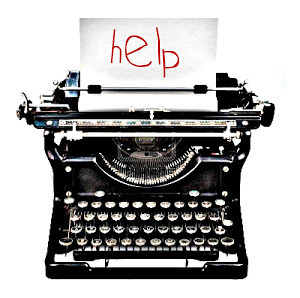
There is also always the concern that a writer has used up all of their good ideas or clever word usements in the first novel, and has nothing left to dazzle the world with in their second effort. I feel this a bit, but don't worry so much about this facet of SNS as I can already see the shape of the second novel, and feel the story and characters coming together in my notes.
Having avoided the subject for long enough, I thought that I would do a bit of research on SNS, and try to come up with a plan to avoid the bane of many writers; to that end, here are my personal tips for avoiding SNS.
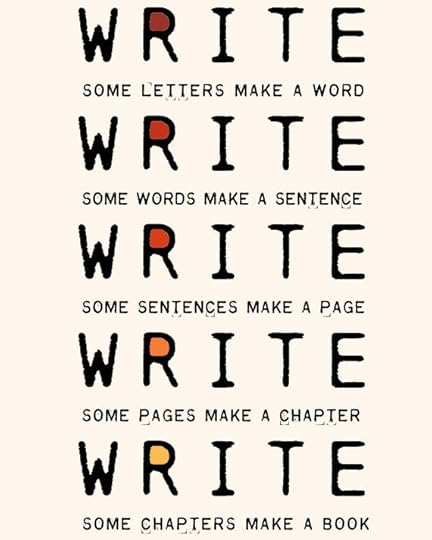
One: Write...start small, but establish a pattern and write everyday
I write short stories and novellas around and in between my work schedule and family life, but wrote my first novel during the summer, and that's how I plan to write the second novel.
Thanks to my teaching job, I have more free time in the summer than during the rest of the year; thanks to my family being so understanding and accommodating, I managed to carve out 3-4 hours each day during the month of August (with some days in July as well) to write. I sat down each morning, reviewed my progress along the storyline from the day before, and tried to write between 1500 and 2000 words each day. I didn't worry about fixing what I had written the day before, knowing that I would get to editing in the months after the rough draft was done.
The important thing is to write everyday, not that it is perfect, or even great, or even good. Write the novel, and then once everything is in place, work with your editor to identify which pieces don't work, need to be fixed/dropped/added.
Two: Don't try to write the same novel again
I've recently gone back and re-read my first novel, "Here Be Monsters", and found (happily) that I still love it. I had a unique character to introduce to the world, and I did. I had a fun and interesting and nasty and thought-provoking story to tell the world, and I did. I've already told that story and in my second novel I'll be telling readers a different one.
"Caretakers" will ask readers to spend some more time with Tyler Cunningham, the protagonist from my first novel, but they'll be introduced to a Tyler changed by the events in HBM (and also in the short work, "Mickey Slips"), and the story I'll be telling is radically different.
The story in "Caretakers" spans decades in the telling, and will require a prologue to effectively set the stage (recently a no-no in the publishing world, but I'm choosing to go with it for the sake of the story, a luxury that I can enjoy being my own publisher). I will be introducing and sustaining more principal characters, and narration of the novel will be from two radically different points of view (Tyler is...odd, maybe unique, and Susan is quite vanilla). This novel will be more of a mystery than HBM (which is really a detective, or crime, novel).
The first novel focuses a lot on establishing the protagonist, the shape of his world (and his place in it), and his interactions given a set of stimuli, and leaves readers contemplating Tyler, his world, and worldview. The second novel will work to place Tyler in a more complete and complex world, have him face and explore multiple challenges in working his way through the central conflict of the story, and will hopefully broaden the scope of thought-provocation by the end of the book to include not only Tyler, but the world that he (and all of us) move through in our daily lives.
Three: Pick your heading...carefully
Your first novel was a single point of literary expression in a universe of writing.
When your second novel is published, you will have a second point on the coordinate plane of the literary world, which math-geeks (and people who bother to finish reading this sentence) know establishes a line and course (or direction of travel) for your writing.
Knowing that your second novel will establish the direction of your writing in the minds of readers and reviewers, you should make certain that the path that you've chosen will bring you in a direction that you actually want to go.
I can feel the shape of "Caretakers" and like the differences and similarities between it and "Here Be Monsters". Having introduced Tyler and the world in which he operates in the first novel, I am looking forward to writing more mysteries that make use of him as a lens through which to look at the way the world works. I am excited to explore the Adirondacks more with Tyler, and to meet different sorts of people than we explored in HBM.

I've done some broad-brush outlines of "Caretakers", along with some research. I have a couple of interviews that I need to conduct before I get down to the fine-level planning of June and July. I am excited and nervous about the actual writing (to be done in August, for the most part).
Although I have worries about facing the laptop on August 1st, and having nothing come out...or finding the pages filling with stale ideas and flat story, I have a secret weapon that is a certain defense against SNS: the knowledge that I wrote a damn good novel the last time around.
That knowledge, that secret weapon, belongs to me...and to every second-time novelist facing SNS. We wrote a good book the last time around, so we know that the words will come this time around also...we also know that everything wrong with the rough draft can be fixed in later versions, with the help of your editing team.
So settle down, brew up some coffee, and start writing!
Jamie
Published on May 29, 2013 09:51
May 23, 2013
Some Teaser/Update Information
I've been working on a number of projects, none of which are ready for publication and/or promotion as yet (which is why I haven't been talking much about them), but it occurred to me that I haven't been blogging as much recently, so this seemed like a good time to bring you up to speed on what's been keeping me busy lately.
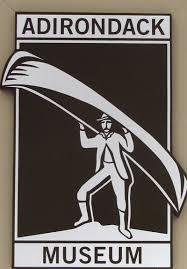
I took a day trip down to the Adirondack Museum in Blue Mountain Lake to do some research on their collections and to get a feel for how their archives of photos and documents might be accessed and accessible. In the novel that I'll be writing this summer, Tyler Cunningham will be digging into the history of the Adirondack Park, and more specifically into the world of the Great Camps to help solve a mystery.
The trip yielded pages of notes and dozens of pictures to help me in planning the coming novel, tentatively titled, 'Caretakers", and has opened the floodgates for more ideas with every passing day; my steno-pad is filling up day by day.
 I've also been doing some research into podcasting and/or rendering some short pieces of my work into podiobooks. Setting up the equipment and space and material has taken some time, and now I just need some quiet time in the house to do some test runs. My plan is to initially host/distribute them through this website, and then depending on their success perhaps to bring them over to iTunes.
I've also been doing some research into podcasting and/or rendering some short pieces of my work into podiobooks. Setting up the equipment and space and material has taken some time, and now I just need some quiet time in the house to do some test runs. My plan is to initially host/distribute them through this website, and then depending on their success perhaps to bring them over to iTunes.

Finally, I'm still working on the story of Tyler Cunningham's first case. The story is taking longer to tell itself than I had anticipated, but I like the shape and feel of it. The story opens in the early summer of 2002, just 7 months after Tyler's arrival in the Adirondacks, and he is still establishing his map of the area and the people. He is invited/coerced by his landlord to help with a family matter that quickly gets out of hand and launches Tyler violently into a recognition/acceptance of his usefulness as a consulting detective.
These three projects, along with the regular family & friends stuff, work, and reading as much as I can, are filling my days in a pleasantly stressful way. I'm looking forward to the end of the schoolyear, so that I can focus on writing and camping over the warm months.
Thanks for your continued interest and support!
Jamie

I took a day trip down to the Adirondack Museum in Blue Mountain Lake to do some research on their collections and to get a feel for how their archives of photos and documents might be accessed and accessible. In the novel that I'll be writing this summer, Tyler Cunningham will be digging into the history of the Adirondack Park, and more specifically into the world of the Great Camps to help solve a mystery.
The trip yielded pages of notes and dozens of pictures to help me in planning the coming novel, tentatively titled, 'Caretakers", and has opened the floodgates for more ideas with every passing day; my steno-pad is filling up day by day.
 I've also been doing some research into podcasting and/or rendering some short pieces of my work into podiobooks. Setting up the equipment and space and material has taken some time, and now I just need some quiet time in the house to do some test runs. My plan is to initially host/distribute them through this website, and then depending on their success perhaps to bring them over to iTunes.
I've also been doing some research into podcasting and/or rendering some short pieces of my work into podiobooks. Setting up the equipment and space and material has taken some time, and now I just need some quiet time in the house to do some test runs. My plan is to initially host/distribute them through this website, and then depending on their success perhaps to bring them over to iTunes.
Finally, I'm still working on the story of Tyler Cunningham's first case. The story is taking longer to tell itself than I had anticipated, but I like the shape and feel of it. The story opens in the early summer of 2002, just 7 months after Tyler's arrival in the Adirondacks, and he is still establishing his map of the area and the people. He is invited/coerced by his landlord to help with a family matter that quickly gets out of hand and launches Tyler violently into a recognition/acceptance of his usefulness as a consulting detective.
These three projects, along with the regular family & friends stuff, work, and reading as much as I can, are filling my days in a pleasantly stressful way. I'm looking forward to the end of the schoolyear, so that I can focus on writing and camping over the warm months.
Thanks for your continued interest and support!
Jamie
Published on May 23, 2013 09:38
May 17, 2013
Arguing with my brain (and losing)...and a plea for help!
I've been working on my current short story for too long.
I know the story, like the story, but am having trouble moving it from my head to my laptop.
I think that the reason for my difficulty is that I've been thinking about the next Tyler Cunningham novel, and it's taking up a lot of mental real estate.
 I can picture the entirety of the story arc for the next novel, tentatively titled, "Caretakers" (in my mind, and in SmartPig meetings only). and keep writing chunks and sequences while driving to work or cooking dinner or watching TV or making coffee in the early morning quiet with my dogs.
I can picture the entirety of the story arc for the next novel, tentatively titled, "Caretakers" (in my mind, and in SmartPig meetings only). and keep writing chunks and sequences while driving to work or cooking dinner or watching TV or making coffee in the early morning quiet with my dogs.
The short story I'm actually writing at the moment is an untitled piece that relates the story of Tyler's first case, and brings to light a few characters that are a part of his small and peculiar social world.
The two writing projects are vying for primacy in my brain, and while I want to complete the short story first (it's about 30% through the first draft at the moment), "Caretakers" is beating the inside of my skull like Athena, ready to be born.
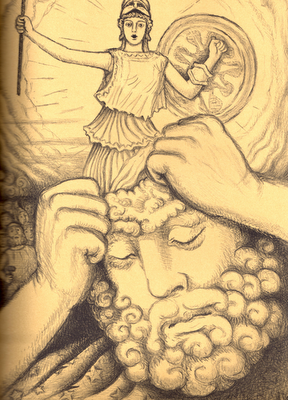
I'm unsure what is the right thing to do. A part of me wants to work through the dueling stories to finish the short piece. Another part of me wants to embrace the novel project, and move forward with that, ahead of my schedule (I had planned to outline during July, and write "Caretakers" during August). A third option would be to do the outline and some planning work for the novel (to a greater or lesser extent), put it away, and finish the short before actually starting serious work on "Caretakers" for the summer.
I would love to hear your thoughts about which path you would follow if you were (or have been) in my place.
Thanks,
Jamie
I know the story, like the story, but am having trouble moving it from my head to my laptop.
I think that the reason for my difficulty is that I've been thinking about the next Tyler Cunningham novel, and it's taking up a lot of mental real estate.
 I can picture the entirety of the story arc for the next novel, tentatively titled, "Caretakers" (in my mind, and in SmartPig meetings only). and keep writing chunks and sequences while driving to work or cooking dinner or watching TV or making coffee in the early morning quiet with my dogs.
I can picture the entirety of the story arc for the next novel, tentatively titled, "Caretakers" (in my mind, and in SmartPig meetings only). and keep writing chunks and sequences while driving to work or cooking dinner or watching TV or making coffee in the early morning quiet with my dogs. The short story I'm actually writing at the moment is an untitled piece that relates the story of Tyler's first case, and brings to light a few characters that are a part of his small and peculiar social world.
The two writing projects are vying for primacy in my brain, and while I want to complete the short story first (it's about 30% through the first draft at the moment), "Caretakers" is beating the inside of my skull like Athena, ready to be born.

I'm unsure what is the right thing to do. A part of me wants to work through the dueling stories to finish the short piece. Another part of me wants to embrace the novel project, and move forward with that, ahead of my schedule (I had planned to outline during July, and write "Caretakers" during August). A third option would be to do the outline and some planning work for the novel (to a greater or lesser extent), put it away, and finish the short before actually starting serious work on "Caretakers" for the summer.
I would love to hear your thoughts about which path you would follow if you were (or have been) in my place.
Thanks,
Jamie
Published on May 17, 2013 06:06
May 10, 2013
Concept Mapping My Protagonist's World

In a recent staff retreat with the SmartPig minions, one of the topics of discussion was the success of the newest eBook, "Mickey Slips", and future related projects.
Tyler Cunningham, the protagonist in my first novel, "Here Be Monsters" has some significant social delays and/or deficits, but even so, he manages to create a network of acquaintances in the Adirondacks after he flees New York City following the loss of his parents on 9/11/2001.
He builds the relationships, as we all do, through interactions in his daily life. Tyler's interactions are limited due to his social awkwardness and lack of understanding of the rules that most people learn in childhood, but still present. He is not a comfortably social being, but his needs and likes determine the shape of his world nonetheless.
We'll use a concept mapping program to lay out his world in terms of the activities he engages in, and the people that he is forced to relate with through those activities. From that map, I will work my way around the map, continuing my work on backstories (many of these people already have backstory notes from my planning notes for the first novel).
"Mickey Slips" was the product of just this type of backstory work, and a discussion with some interested readers who expressed an interest in finding out more about the relationship between Mickey and Tyler hinted at in "Here Be Monsters".
While the short story presented in "Mickey Slips" takes place after the events of "Here Be Monsters", other stories focusing on the characters in Tyler's world may take place in the months and years before my first novel took place (as is the case with my current WIP, a short involving Cynthia, a character from the novel, and Maurice, Tyler's landlord)
My primary interest is in deepening the backstory on Tyler's world, but also to find which of the people and/or aspects of his world could make for interesting stories. I'd like to eventually work my way around the map of Tyler's social world in stories, and release a collection in print and eBook formats.
If you have any characters or events in Tyler's life of particular interest, please feel free to get in touch with me, and who know ... maybe a story will come out of it.
Thanks,
Jamie
Published on May 10, 2013 09:04



